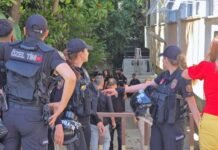Former acting US attorney in Manhattan Joon H. Kim, who oversaw the Turkish banker Mehmet Hakan Atilla, who was convicted of helping orchestrate what Kim has called a “massive and brazen scheme that blew a billion-dollar hole in the Iran sanctions regime,” has complained on the attacks coming from Turkey.
“What we realized,” Kim said in an interview to the New York Times on Monday, “was that independence meant more than just resisting interference from other parts of the US government, but also having the ability to withstand criticism and attacks from anywhere, including foreign governments.”
Kim’s office had obtained a guilty plea and cooperation agreement from a co-conspirator, Reza Zarrab, an immensely wealthy gold trader who became the government’s star witness, testifying that Recep Tayyip Erdoğan, when he was Turkey’s prime minister in 2013, knew and approved of the sanctions-busting activity. Kim stated that “The attacks from Turkey based on wild conspiracy theories were frankly ludicrous.”
Kim has also noted that Reza Zarrab’s guilty plea was critical because it validated the government’s case and showed a key conspirator “accepting responsibility for his crimes.” “He pleaded guilty because he was guilty,” Kim added. “He was not able to buy his way out of these charges.”
Kim and his prosecutors had found themselves in the unusual position of being the target of harsh attacks from Erdoğan, now Turkey’s autocratic President, who denounced the case as a plot against his government and even raised the matter in a phone call with President Donald Trump.
Turkish officials claimed the evidence had been fabricated by the Gülen movement, a movement banned in Turkey by labeled as a “terrorist organisation.” Turkey even opened an investigation into Kim and Bharara, who had announced the charges in 2016.
Kim said he was glad the case could be presented in a full-blown trial, with Turkish reporters and crowds of spectators in attendance. “It was important for this evidence to come out in a public courtroom for everyone to assess,” he said, “to show to the public and others who are beyond our borders who are skeptical of our motivations, of our system, to see it work, including the public in Turkey.”
Kim has also noted that the prosecutors from his office, which has long been called the “Sovereign District” for the way it jealously guards its independence from Washington, were shown to be professionals “who were not going to be intimidated and who were just doing their jobs.”
“What we realized,” Kim said, “was that independence meant more than just resisting interference from other parts of the US government, but also having the ability to withstand criticism and attacks from anywhere, including foreign governments.”
The US jury in the trial of Atilla, an executive of Turkey’s Halkbank charged with participating in a scheme to evade US sanctions on Iran, in US federal court on early January reached a verdict of guilty on five counts, including bank fraud and conspiracy, and not guilty on one count of money laundering.
Atilla, Zarrab and seven other people, including Turkey’s former economy minister and two additional Halkbank executives, were charged with engaging in transactions worth hundreds of millions of dollars for Iran’s government and Iranian entities from 2010 to 2015 in a scheme to evade US sanctions.
Only Zarrab and Atilla are currently in US custody after separately being arrested upon trying to enter the United States in 2016 and 2017, respectively. Zarrab made a plea deal with prosecutors and has served as the key witness in Atilla’s trial.
Zarrab testified in New York federal court in early December that he had bribed Turkey’s former economy minister, Mehmet Zafer Çağlayan, in a billion-dollar scheme to smuggle gold for oil in violation of US sanctions on Iran. Zarrab said that Turkey’s then-prime minister and current president, Erdoğan, personally authorized the involvement of Turkish banks in the scheme.
Zarrab also said he paid money to secure his release from prison in Turkey in February 2014 and that those payments were partly bribes. The Turkish government seized the assets of Zarrab and his relatives following his testimony in the US court.
Hüseyin Korkmaz, a former İstanbul police officer who testified at the New York trial of Atilla, called Erdoğan the “No. 1” target in a group that also included Çağlayan, and Süleyman Aslan, a former chief executive at Halkbank, a large Turkish state-owned bank that was central to the sanction-busting scheme.
Police notes of the Dec. 17, 2013 operations show that Zarrab personally talked with Erdoğan on April 13, 2013 and asked for an official police guard. Erdoğan and his Cabinet approved it immediately. A phone call and a video in the Dec.17 file show that Zarrab in July 2013 sent an unspecified amount of money to the Service for Youth and Education Foundation of Turkey (TÜRGEV), run by Bilal Erdoğan, Erdoğan’s son.

The Turkish Halkbank and one of its executives, Hakan Atilla, were found guilty of breaking US sanctions on Iran this January. During the case, the Turkish-Iranian gold trader Reza Zarrab testified that Çağlayan had accepted $40-50 million in bribes as part of the scheme.
Çağlayan attended an event at a cultural centre in Ankara’s Beştepe district on Monday. He was warmly greeted by the chairman of the Union of Chambers and Commodity Exchanges of Turkey and the Ankara Chamber of Industry at the event.















